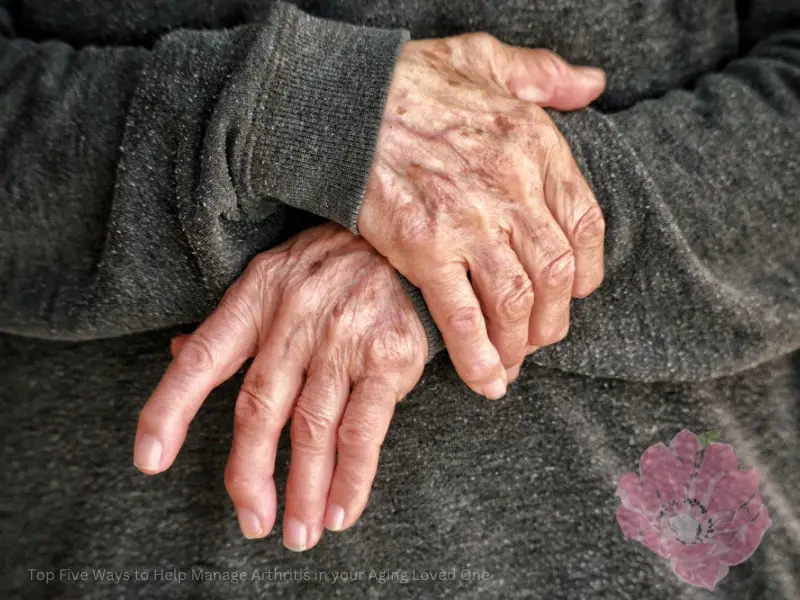
If you or your loved one are one of the six million Canadians affected by arthritis pain and discomfort, you know how life-shaping it can be, impacting friends, caregivers, family members and beyond.
As the most common cause of physical pain and disability for seniors — and a chronic condition that can get progressively worse — arthritis can be a major concern for those taking care of an elderly loved one. Arthritis in its different forms (such as in the hips, fingers, spine or knees) can not only disrupt an aging person’s normal daily activities, it can also come to jeopardize their freedom and independence.
While some arthritis risk factors are unfortunately not something that can be changed, there are certain proven ways you can help your elderly loved one manage their arthritis more effectively. If your loved one has been diagnosed with arthritis, here are five actions you can take as their concerned caregiver.
1) Increase Their Activity and Low-Impact Exercise
Helping your senior loved one to become more active can make an enormous difference to their comfort and safety as they age. It’s especially important to try and prevent a sedentary lifestyle and to encourage good low-impact exercises. These could include things like swimming, water aerobics, yoga or tai chi, chair aerobics, or even going for walks more frequently. Activities like these will help loosen the tissues of their arthritic joints, increase their flexibility, and build joint-supporting muscle strength.
2) Maintain a Healthy, Nutrition-Rich Diet
In addition to keeping physically active, sticking to a diet of healthy, balanced meals will help your elderly senior shed some pounds if they’re carrying extra weight, helping further reduce some of the stress on their affected joints. It’s a common occurrence, sadly, for arthritis to be made worse when older people don’t get the nutrition they need. To help prevent this, a dietary supplement may be something to consider, in consultation with your loved one’s healthcare practitioners.
3) Apply Heat and Cold to Sore Areas
To help relieve their arthritis-related discomfort, your senior loved one may benefit from heat therapy to their stiff or sore areas. This can be achieved by using heating pads, hot packs, paraffin wax treatments, or a warm bath or shower. Following one of these heat treatments with a cold pack can then help to reduce joint swelling. Keep in mind that the heat or cold shouldn’t ever be too extreme — think warm instead of hot — and ensure that their skin always remains protected.
4) Encourage Mind-Body Techniques
More and more, studies are showing the very real benefits of a strong mind-body connection. As anxiety and depression can increase in arthritis sufferers, this connection is an important one to foster in your loved one when their arthritis flares up, and can help facilitate healing. A positive mind-body healing interaction can happen with things like massage, relaxation therapy, and meditation and breathing techniques such as yoga. As their caregiver, you may find you benefit from these techniques and practices, too!
5) Get Relief Through Doctor-Recommended Medications
Following the advice of your senior loved one’s doctor, there are many over-the-counter and prescription medications to help reduce joint pain and swelling. Talk to their healthcare team to find out which ones make sense, according to the severity of your loved one’s symptoms and their other medical issues. Always keep their doctor up-to-date and informed about any and all medications, prescribed or otherwise, as certain arthritis medications can interact with others and pose a health risk.

How Just Like Family Home Care can help
Caring for an aging arthritis sufferer isn’t an easy undertaking. And when you’re balancing family, work or health demands of your own, it can easily feel overwhelming. If you find yourself in this situation, we’re more than happy to have a friendly conversation about our different support options, and come up with a plan that you feel comfortable with.
Our highly trained Just Like Family team members understand arthritis-related issues, and they’re here to provide your loved one with expert, reliable care — keeping them active, well-nourished, and mentally supported — while putting your mind at ease. Please know you can get in touch at any time.
For more information on arthritis and its impacts on many individuals in Canada and worldwide, please visit the Arthritis Society Canada’s website, or view the links below to learn more.
NOTE: These tips are intended for informational purposes only and not intended as medical advice. We encourage readers to expand their knowledge on this topic for accuracy and completeness.